
12 май 2025 : У вокалиста 3 DOORS DOWN рак
Вокалист 3 DOORS DOWN Brad Arnold сообщил, что у него обнаружен рак:
«Привет всем, это Brad из 3 DOORS DOWN. Надеюсь, у вас сегодня отличный день. Сегодня у меня для вас не очень хорошие новости. Пару недель назад я заболел, а потом пошел в больницу, прошел обследование, и мне поставили диагноз - почечно-клеточная карцинома, которая дала метастазы в легкое. Это четвертая стадия, и это не очень здорово. Но знаете что? Мы с вами служим могущественному Богу, и Он может преодолеть все. Поэтому у меня нет страха. Я действительно, искренне не боюсь этого. Но из-за этого нам придется отменить наш тур этим летом. И мы сожалеем об этом. И я буду очень признателен, если вы будете молиться за меня при каждом удобном случае. А мне, пожалуй, пора немного послушать [песню 3 DOORS DOWN 2008 года] «It's Not My Time»".
Спасибо вам, ребята, огромное. Бог любит вас. Мы любим вас. Увидимся».
|





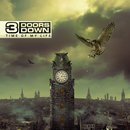
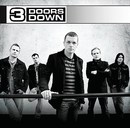
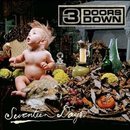
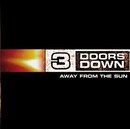
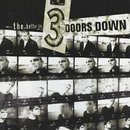


They made their mark early, selling 6 million copies of their debut album, and rather than allow that moment to define themselves, they have developed as musicians, songwriters and friends. The stories and emotions related in their songs resonate with audiences: Their music and lyrics are as approachable as the guys in the band.
“The main thing is the lyrics,” says Brad Hardin, a radio programmer in Tampa, Florida, at one of the first stations to play 3 Doors Down's music. “I've watched them mature as a band. They work hard, they do anything for their community and they're so sincere and easy to be around. And that comes out in their music.”
“I’ve got to make this life make sense” is a line from one of 3 Doors Down’s most popular songs, “Away From the Sun” and in many ways it sums up a key attraction to the band’s work: The directness of Brad Arnold’s lyrics.
“Something I have always tried to do when writing a song: Talk about something besides the rims on the car, something somebody can identify with, but make it open-ended so a listener can make it adapt to their own life,” he says.
That open-ended element is one reason their music has been used to promote every major sports league from college basketball to hockey, they have connected with the military in consistent and meaningful ways and their foundation takes care of children in need.
3 Doors Down has a great relationship with radio stations and when Billboard printed its Top 100 Pop Songs, 1992-2012, the band was represented twice in the top 25. “Here Without You” was No. 8 and “Kryptonite” was No. 25 on a list based on Top 40 radio airplay.
They have had a few changes in their lineup, Chet Roberts replaced founding member Matt Roberts on guitar in 2012 and Puddle of Mudd's Greg Upchurch became the permanent drummer in 2005.
Ken Fermaglich, who has booked the band since they signed a deal with Universal Republic in 1999, says success has not changed them as people. “A lot comes back to their down-to-earth, loveable quality. They’re very loyal guys.”
Their story begins in Escatawpa, Mississippi, a town of fewer than 4,000 residents located 35 miles east of Biloxi. Brad Arnold and Matt Roberts played tee-ball together as kids, remaining teammates as their hobby moved from baseball to music.
With Roberts on guitar and Arnold on drums, they created a three-piece while in middle school. One of the local high school bands featured guitarist Chris Henderson and bassist Todd Harrell and eventually they joined forces to create 3 Doors Down and developed a following in the Biloxi area, mixing originals and covers of Pearl Jam, Metallica and Bush.
Once they had a following, the band recorded an EP at Lincoln Recording Studio in Pascagoula. “We weren’t trying to get a deal,” Arnold remembers, “just make a record.”
"Kryptonite" was played in a radio ad to promote a 3 Doors Down gig, which caught the ear of the operations manager at WCPR in Biloxi, Kenny Vest, who promptly added "Kryptonite" to the station’s rotation.
Vest would later connect the band with a management company, McGathy Promotions, and a label, Republic Records. Universal Republic A&R executive Tom Mackay remembers being mystified by the intensity of their fan base, but wondered why it was so limited to such a small area.
“It was the spring of 1999,” he recalls, “and we would call record stores and radio stations to see what was going on locally. When we called Biloxi the reports we would get back were so over the top it was unlike anything we had ever seen.”
At WCPR, “Kryptonite” was No. 1 for 15 weeks. Monte Lipman, who founded Republic Records with his brother Avery in 1995, found that astonishing. “Friends and family can make enough calls for a song to hit No 1 for a week, but this was unheard of,” he says.
The second place “Kryptonite” caught fire was WXTB in Tampa, Florida, a station that was among the first in the country to play music by Creed, Matchbox Twenty and Collective Soul. Operations manager Brad Hardin heard the EP and played it for his staff, whose reaction was as enthusiastic as his own.
“We happened to have a slot open that week and said let's put it in,” Hardin says, noting that it is a rarity for any station to add music from an unsigned band that is not locally based. “The request lines blew up.”
Monte Lipman was the first label head to get to Mississippi to meet with the band and wound up booking them a New York showcase at CBGB. “They were pretty bad,” Lipman remembers. “Brad can laugh at it now, but we knew they could be taught to be good performers. I felt that we heard four hit songs that night.”
They went into the studio to record the songs that would become “Better Life,” working on them first in local studio before meeting up with producer Paul Ebersold.
“There was a deer in headlight effect,” Arnold says. “If we hadn’t done that little recording we would have been so lost when we went into the studio. At least we had a little bit of understanding. Paul Ebersold was the perfect person to be our producer. Paul wouldn’t scare us, but he made it clear – ‘this is your shot. You have to get it right this one time.’”
Based on the response, they got it right. “The Better Life,” released in February 2000, was certified six times platinum and a new version of "Kryptonite" peaked at No. 3 on the Billboard Hot 100 and topped the Airplay Chart for six weeks. In 2000, it was the 11th best-selling album of the year and “Kryptonite” would be named the No. 1 song for the year at all of radio’s rock formats and secure a Grammy nomination.
Arnold remembers the day he wrote it and heading to Harrell’s place to practice with Roberts. Harrell walked through the room on his way to take a shower and Roberts tried playing what Arnold was singing. “And Todd sticks his head out the door with a big wad of soap in his hair and yells what is that?,” Arnold remembers. “That’s a hit.”
While "Kryptonite" led the way, "Loser" and "Duck and Run" became international hits: “Loser” topped Billboard’s Mainstream Rock chart for 21 weeks and “Duck and Run” followed it with a three-week run at No. 1 on that chart. BMI presented Arnold, in 2002, the award for songwriter of the year.
Hardin saw the band perform in Tampa at the radio station's festival Livestock. “Seeing 20,000 people sing 'Loser' when it hadn't been on the radio that long made me realize they had something special,” He says.
3 Doors Down, which had opened shows for Creed, quickly became a headliner and word got out that the band delivered a strong live show. Success and the roadwork took a toll.
“Reality set in,” Chris Henderson says. “We had been on the road for two years and the label wanted another record. We wanted a break. We’d almost forgotten how to do it. No one liked anyone’s stuff, we weren’t ready to work yet,” a sentiment expressed in the title track of the second album “Away From the Sun.”
“Away From the Sun” immediately went gold, peaking at No. 8 on the Billboard 200, and –would eventually go four times platinum. The biggest of its four hits was “When I’m Gone,” a song adopted by the military as it hit No. 1 at Top 40 and Mainstream Rock and No. 4 on the Billboard Hot 100.
“There are only a few songs we’ve written on the road and ‘When I’m Gone is the only hit we’ve written on the road,” Harrell says. “We were playing it in Europe and could immediately tell it was something special. From day one, it got the crowd up. I always knew it would do well.”
By the time of their third album, “Seventeen Days,” anticipation ran high for its release as evidenced by its debut at No. 1 on the Billboard Top 200 and the single “Let Me Go” landed in the top 10. The album title referred to the number of days it took to write the songs.
“The difference in five years was amazing,” Arnold says. “I was 25 or 26 and it was a lot to take in. About that time, some marriages and relationships were starting to crumble a bit. ‘Seventeen Days’ was so full of emotion.”
Considering the band's emotional state, Arnold laughs when he talks about the album's biggest hit, "Let Me Go," about a break-up. “I wrote it for 'Spider-man 2.' It’s funny,” Arnold says, “because it also had meaning to me personally.”
For their fourth album, 3 Doors Down used the band’s name for its title and debuted at No. 1 when it was released in May 2008, hitting gold within a month. “It's Not My Time,” the second song Arnold wrote a for a movie (“Poseidon”) that wasn’t used, topped the Billboard Mainstream Rock Tracks chart for three weeks. The fifth studio album, “Time of My Life,” debuted at No. 3 when it was released in July 2011.
It was the first time the band had reached outside the group for a co-write on a song. “Using outside songwriters gave us a fresh twist,” Arnold says. “We don’t want to be repeating ourselves as songwriters.”
Three new tracks appear on this “Greatest Hits” album, “One Light,” “Goodbyes” that Arnold wrote after a friend passed away, and “There’s a Life.”
Chris Henderson explains “One Light” as song that points out “everyone is looking for the leader to get behind so that change can begin.” Arnold adds: “It’s about giving the world more than you can take from it.”
It could also be a description of 3 Doors Down’s Better Life Foundation that they founded in 2003 to help children in need of food, shelter and medical attention. “Every time we do something with our foundation or for the military, we’re just the catalyst,” Arnold says. “When I leave an event, I feel like I have been given something. We’ve been able to do a lot of good